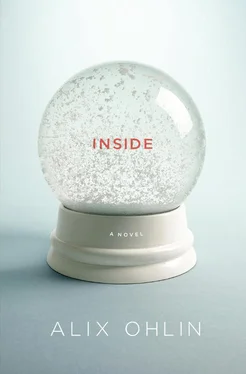All this Mitch accepted as gospel throughout his childhood and adolescence, as Malcolm, too, became an engineer and moved to Toronto. Not finding himself inclined to engineering, Mitch took a degree in psychology. But at Christmas one year, when he told his mother his plans to pursue this in graduate school, she burst into tears.
They were sitting at their tiny kitchen table, and he stared at her, dumbfounded. He wasn’t used to disappointing her, and had expected she’d be pleased; she was always proud of his success in school. “It’s almost like a doctor,” he said, pathetically.
Rosemary was shaking her head. “This is because of your father, isn’t it?”
Mitch had no idea what she was talking about, and by now he rarely even thought about his father.
Tears poured down his mother’s face. “I knew it,” she said. “I kept watching you, knowing it would come out. And here it is.”
He stood up and put his arm around her. “This is just what I’m interested in,” he told her. “What I care about.”
She took his arm and guided him back into his chair, then held his hands and looked into his eyes. “This fascination you have with people’s minds, all your curiosity. It’s because you want to understand what made him do a thing like that. But you aren’t like him. You know that, don’t you? And some things can’t ever be understood.”
In that moment he felt something tilt inside him, as if a picture that had been hung upside down was suddenly righted, and he saw clearly what it showed.
Heart attack was what they told the neighbors, because Rosemary didn’t want their pity, didn’t want stories to surround her boys. Protecting them was always her first and overriding instinct. But the truth now came back to him with the shock of recognition: his father in the basement, on a sleeping bag, with an empty bottle of pills on the floor next to an empty bottle. He remembered a rancid stench that was mixed with the odor of bleach, because his mother had cleaned everything up before calling the doctor and asking him what to do.
Rosemary dried her tears, carefully and quickly; she never indulged herself in anything, even crying. “He was a sweet man, really,” she said. “But he had such a darkness in him. His parents told me he was never the same after he came back from fighting. It weighed on him, the things he saw in France.”
Mitch squeezed her hands.
“I always hated that he left us,” she said. “I knew I wasn’t enough for you boys.”
“That’s not true,” he said. He would have liked to say, You’ve given me everything I need. He would have liked to say, Feel how much you are loved. Instead he sat with her, and let her talk about his father.
His mother wasn’t sure about Grace at first. She was so young, so excited about psychology. She had no idea how to cook and no immediate plans for a family.
“That’s just fine,” Mitch’s mother said. “You take your time.”
But it was clear she was reserving judgment. Partly this had to do with psychology, which she had always distrusted; she didn’t truly believe anything could be achieved by all this talking . Compared to Malcolm’s work — he consulted on bridges and roads, projects their mother would have liked to put plaques on — Mitch’s was invisible, intangible, and, quite possibly, nonsensical. Usually, when he came home to visit, he’d give her the briefest possible update and then change the subject to the news or the weather.
Snow was the great equalizer of their family. They all hated it, the three of them having shared the task of shoveling for years. They could talk about it for hours — when it would start, how much was coming, when it would end. Nothing bonded them so completely as snow.
But Grace. The first time she heard them ranting about snow, she said, “You just have to get out in it!”
Rosemary smiled at her and lit a cigarette; for all she had warned the children against smoking, she herself was never able to quit. “Now why would I want to do that, dear?”
“You have to embrace the snow. Have fun with it. Go skiing, build a snowman, throw snowballs. That’s what you should do,” Grace told her, her eyes shining. “I promise you, it’ll change your life.”
“Ah, well,” Rosemary said. “I suppose I like my life the way it is.”
In the brief pause that followed, Grace’s cheeks turned red and she looked down at the table until Malcolm’s wife, Cindy, who was good-hearted, changed the subject by telling Rosemary that she was going to start selling Avon.
“We have such pretty lipsticks. I’ll bring you some.”
Rosemary’s orange lipstick was a running joke among Cindy, Malcolm, and Mitch.
“Well, that would be nice, dear,” Rosemary said. “I’m having such a hard time finding my shade. I believe that they’ve stopped making it. Last time I went to Cumberland’s, the girl there said they hadn’t seen it for months.”
So the conversation moved on, and Grace recovered. She always did, and never gave up. Her persistence, in the end, was what won Mitch’s mother over — that, and the first Christmas they all spent together. Grace had been quiet for most of the day, and Mitch could tell she was nervous. She was stepping back, listening, trying to figure out how to slip into this already-formed family without disturbing its contours. They opened presents together on Christmas morning, after a breakfast of pancakes. When Rosemary opened her gift from Grace, she was silent for a long time. Mitch braced himself, wondering what was wrong. Then he saw, to his horror, that she was crying, his mother who hardly ever cried.
He stared at Grace, who didn’t notice his concern. She was looking at Rosemary, waiting.
It was a box of orange lipsticks. She must have gone to every drug store in Montreal, buying up their entire supply of Rosemary’s favorite shade. There was enough ugly lipstick in that box to last a lifetime.
His mother said, “This might be the nicest thing I’ve ever seen.”
As she got older, Rosemary grew freer with her tears. She cried at Mitch and Grace’s wedding; she cried when her grandchildren were born; and she cried, well and truly sobbed, when Mitch had to tell her that he and Grace were getting divorced.
“Now you’ll never have a family,” she managed to say.
For a fleeting instant, and for the first time in his life, he hated her. How could she say something so awful to someone who already felt like a failure? And what was she talking about? He was still young, and maybe he’d remarry; if he wanted a family, he could still have one.
But she was right, of course. He never did.
Five years after his divorce, Rosemary was diagnosed with stomach cancer.
“I always thought it would be my lungs,” she said with typical dryness. “Now I’m glad I never gave up smoking.”
It was winter, and Mitch had driven her to the hospital. They were sitting now in his parked car, and he breathed in her familiar smell of cigarettes and Jean Naté perfume.
“I don’t know about that,” he said.
They had been given a timeline, and it was short. Malcolm was flying in from Mississauga. Cindy and the kids would come later, by car, for one last visit. They had discussed all this calmly in the lounge over coffee, his mother orchestrating the next few months, knowing exactly what had to be done. Her knack for organization was outrageous. She should, he thought, be put in charge of the world.
At the time Mitch had a girlfriend named Mira, a nurse he’d met at work. Short and jolly, she cooked delicious Indian meals she had learned from her mother, and supported him through Rosemary’s entire illness. She came along to the hospital whenever he wanted her to and stayed home when he didn’t. She met Malcolm and Cindy but didn’t try to ingratiate herself with them. At night, when he cried, she held him.
Читать дальше












